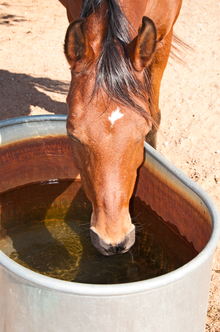During hot summer months and with drought blanketing the country, horse owners are being urged to make sure that horses are getting the water needed to guarantee good health. Water consumption is extremely important in the digestive process to avoid colic impaction, dehydration and other life threatening ailments.

Importance of plenty of fresh water for horses
Dehydration in horses is an extremely serious situation during hot, dry weather and occurs not only during strenuous exercise, stressful situations, or in cases of diarrhea, but also any time temperatures rise far above normal.
The average horse needs 5 to 10 gallons of fresh water per day. A horse deprived of feed, but supplied drinking water, is capable of surviving 20 to 25 days. A horse deprived of water may only live up to 3 or 6 days. After lacking water intake for two days a horse may refuse to eat and exhibit signs of colic and other life-threatening ailments.
During summer months, horses are often engaged in more activity than during the colder winter months. This activity leads to the need for more water consumption. Lack of water consumption by the horse during this time of usage could lead to dehydration.
Dehydration in horses is an extremely serious situation and can occur during strenuous exercise, stressful situations, or in cases of bouts of diarrhea. The lack of water can include the lack of electrolytes. Electrolytes include the minerals sodium, chloride and potassium and the lack of electrolytes can lead to kidney failure in the horse, if the horse is not rehydrated quickly.
In addition to making sure your horse always access to plenty of fresh, clean, palatable water, you should recognize when your horse is becoming dehydrated and its fluid balances need attention.
Dehydration is often not recognized until 5 percent or more body weight is lost. Signs of dehydration are weakness, depression, sunken eyeballs, dry mucous membranes, slowed capillary refill time, and increased heart rate.
Adequate water intake is critical. On average a 1,000 lb horse needs 8 to 10 gallons of fresh water per day. As the air temperature increases, even non-exercising horses sweat and consume more water. When exercising at temperatures above 70°F, adult horses may consume 20 to 25 gallons of water per day.
It is also advisable to offer water containing horse electrolyte solutions mixed with water. However, the provision of fresh water is always required when electrolyte water is offered. This can be beneficial especially if the horse is losing electrolytes through sweating. However, some horses will not willingly drink electrolyte solutions mixed with water so an alternative water source should be made available.
An additional management practice to decrease heat stress is avoiding exercise during the hottest time of the day, typically from 10 a.m. to 4 p.m. Turn horses out to pasture at night, especially if the pasture lacks shade.
In addition to following these management recommendations, owners should be aware of the signs of heat stress suffered by horses iduring hot weather. It is important to understand and recognize the signs of heat exhaustion and to know what to do when these signs have been observed.
Horses with heat exhaustion may continue to sweat excessively or in severe instances may stop sweating altogether. Signs of heat stress include weakness, stumbling, increased respiratory rate (> 32 breaths per minute), and an increased rectal temperature (>102 oF) after removal from exercise.
Notify your veterinarian immediately if any of these signs are observed. Before your veterinarian arrives owners should provide frequent small amounts of cool water for the horse to drink.
